by Jenny Rose | Mar 21, 2019 | Emotional Intelligence
Once I lived with an avid outdoorsman who fished and hunted. He frequently spent his weekends camping during spring, summer and fall. I knew how much pleasure he took in this time away from the rest of his life, and always saw him off with some variation of “Have a great time.”
It never failed to make him mad.
He said it “put pressure” on him when people wished him well.
I felt both dumbfounded and amused by his attitude. I couldn’t imagine feeling insulted because someone who loves you wishes you a great time.
I’ve been remembering that man this week because I’ve been thinking about giving and receiving blessings.
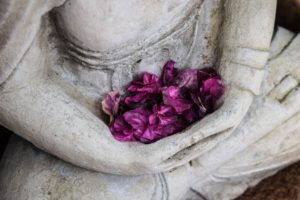
Photo by Chris Ensey on Unsplash
Traditionally a blessing was an important social exchange. If one was lucky enough to meet an incognito god or goddess on the flanks of Mount Olympus or in some other lonely place and received their blessing, they were broken open to receive it fully, their deepest and most private hopes, fears and pain exposed. It took courage, strength and humility to receive such a gift.
The poet David Whyte suggests we must make ourselves large for the exchange of blessings. To give such a favor is an act of generosity. To receive it is an act of growth. In the last several days I’ve thought a lot about making oneself big enough for blessings. I’ve remembered specific words and ways in which I’ve blessed others, including the simple blessing of my love.
Sometimes I’ve felt the love I gave another in words and actions was recognized, appreciated and fully received. Other times I have not, and I’ve always made that about me. My love was unwelcome and had no value. Now I wonder, though. Perhaps it wasn’t me at all. Perhaps they were not big enough in that moment to accept my blessing.
That thought leads me inexorably to wondering how many times I have not been big enough to receive a blessing from someone else. I’m forced to admit there have been plenty of times; probably many more than I’m aware of.
Am I big enough to be loved hugely, or receive a large sum of money or have my creative hopes realized?

Photo by Joshua Earle on Unsplash
I’m not sure I am. I’m big enough to be loved moderately, but hugely? No, that feels like too much. I can feel myself tensing, rounding, drawing my knees up and wrapping my arms around my body as I imagine someone trying to give me huge love. I’m not worth that. I’ll be sure to disappoint. They’ve mistaken me for someone else.
I’m too small for such abundance. I choose to be too small. I’m afraid to stand up straight, open my arms and heart wide, and accept huge love. I choose to limit what comes in. I’m afraid of the pain of being broken open. I can make myself bigger in spite of my fear, but I usually don’t in order to accommodate a blessing.
Therefore, I impoverish myself. I have people around me who love me. Perhaps they love me as deeply as I love, and they long for me to receive it as I long for my love to be received, but my own inability to be large enough to allow their blessing into my life makes the energy of their love impotent and weakens our connection. My fear and choice to be small, hard and rigid, like a rolled-up porcupine, not only limit me; they limit others as well.
My most frequent prayer on behalf of others is that they might experience the greatest good. I use that specific language because I know I don’t know what the greatest good is for any of us. Sometimes what we want the most in life is not in our best interests. Sometimes the hardest experiences are the most useful to us. Sometimes what we long for is what we most need. I don’t know. I’m not big enough to know. I can’t see far enough down the road to judge the value in any experience. All I can say, along with everyone else, is what feels pleasant and what feels uncomfortable to me in the moment.
Oxford online dictionary defines blessing as “a beneficial thing for which one is grateful; something that brings well-being; a person’s sanction or support.” We all can make a list of crises in our lives that later turned out to be blessings in disguise. Maybe it’s all a blessing – each breath, each heartbeat, each tear, each drop of blood and sweat, each moment, each life and death. Gratitude is a practice encompassing all our experience.
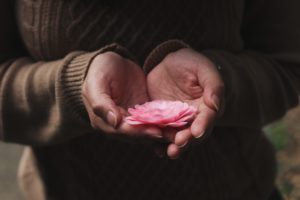
Photo by Ester Marie Doysabas on Unsplash
To receive a blessing is to allow an expression of support, affection and maybe even love touch us. It’s an act of trust in the intention of the one who blesses us, as well as faith in our own worth. We need one another in this life, and healthy reciprocity makes connections stronger. It’s not enough to be the strong one who maintains safety by extending love and support while accepting none; we must also be willing to be down and out, to be lost and confused, and to receive help and encouragement in our turn.
Last weekend two friends and my partner helped me empty out my flooded storage unit, chip ice, sweep water, put down pallets (transported in my friends’ truck), and put everything back again. We were ankle-deep in mud, slipped and slid on ice and splashed around in water as we worked. It needed to be done and I wanted to do it. I know I needed help. Yet from the beginning I was blocking the support and caring around me. I fussed about my friends using their Saturday to undertake such a messy job. I felt bad about using their truck. I was worried somebody would hurt their back heaving my wet mattress and box springs around. At the same time, I was deeply touched and uncomfortable because I could feel their caring and concern and I didn’t know how to take it gracefully. I wanted to be big enough to accept friendship and love from these dear ones, but it was really hard. I know, however, I’m not good at receiving and I want to be better. I also know, had our positions been reversed, I would have greatly enjoyed helping out a friend on a windy spring Saturday morning.
I endured my discomfort. Now that it’s done, what I will remember is not what was damaged and lost, or even the mess. What I’ll remember is the four of us tackled a necessary job, worked together and had a good time doing it.
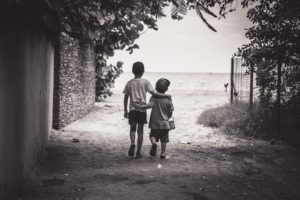
Photo by Juan Pablo Rodriguez on Unsplash
It was a blessing. I stretched as wide as I could to receive it.
I need more practice.
When I tell someone I love them, or wish them a great day, or the greatest good, I mean it. It’s not just words. My heart is in it. When I light a candle and reach out with all I am to a loved one who is far away, I’m offering the best I am as a blessing, a candle in dark times, a comfort in distress. I want the gift of my love and support to be received and used.
Probably the best place to start is to learn to receive with more grace myself, to expand, and to humbly accept whatever blessings come my way, whether plainly visible or in disguise.
Have a great day, readers. Greatest good to you. Blessings.

Photo by Stephen Leonardi on Unsplash
All content on this site ©2019
Jennifer Rose
except where otherwise noted
by Jenny Rose | Jan 3, 2019 | A Flourishing Woman, The Journey
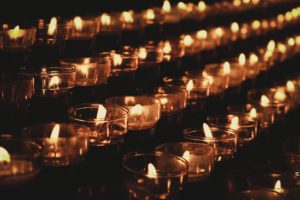
Photo by Pascal Müller on Unsplash
I came across a poem by Ursula K. LeGuin (see below) and found it beautiful and timely. The wheel of cycles and seasons has swung around to the resurrection of light once more, and we wish one another a happy new year, each of us with our own hopes and fears for the months ahead.
For much of my life, I equated love with protection. When I became a parent, the vulnerability of my sons added exponentially to my own. In common with many parents, I struggled fiercely to protect them through infancy, childhood and beyond. Naturally, we protect others from what we ourselves most fear. In my case these fears include pain, loss, addiction, abuse and abandonment. I tried to shield my children from those people and experiences that hurt me, lest they be hurt in the same ways.

Photo by Nicole Mason on Unsplash
Certainly, in the case of small children, animals and others who have no voice or are unable to use it, protection can be an act of love, but I’ve thought for some time now that we carry it too far, especially when we seek to “protect” our perfectly capable adult children, partners and friends. At some point our impulse to protect others becomes selfish. We do not want to bear witness to a loved one’s pain, let alone our own. We do not welcome the responsibility of telling the truth. Protection becomes a pathological means of disempowering others and binding them to us because we don’t want to be alone or the independence of our loved ones threatens us.
To be over-protected is to be without the freedom to develop confidence in our own good sense, strength and courage. We’re never allowed to stumble and fall and we don’t have to figure out how to comfort ourselves, clean our scraped knees and move forward. We over-protect out of fear or control, not love, and our constant vigilance of our loved one or loved ones teaches them fear as well. Fear makes our lives smaller, not bigger.
This new year, I don’t wish you photoshopped health, prosperity and happiness, and I don’t have a list of resolutions I hope will lead me to those things, either.
This year, I wish us each the ability to stand in our own power.
 May we learn to love our bodies as they are. May we live joyfully in our skin. Let us teach our bodies new things and work with them to become as strong and healthy as we can. May we allow our bodies to be and to change.
May we learn to love our bodies as they are. May we live joyfully in our skin. Let us teach our bodies new things and work with them to become as strong and healthy as we can. May we allow our bodies to be and to change.
This year, may we make mistakes. May we become lost and confused, and then find our way again. May we find out we’re wrong, and tell everyone. May we be vulnerable, get hurt and heal ourselves.
May we wander far from home without a map and walk a thousand miles, exploring new places and ideas. May we listen to a different kind of music and read a different kind of book. May we do something we’re afraid of.

Photo by yatharth roy vibhakar on Unsplash
Let the new year bring us laughter that makes our bellies ache and tears that fall like warm rain on our anguish. Let us fall head over heels in love with something or someone as though it’s the first time we’ve ever done it and we just know it will all be perfect. Let us make friends with our rage and give it something productive to do. Let us tell someone about our deepest shame.
May we know loneliness, boredom, disappointment and humiliation, and balance them with companionship, engagement, satisfaction and validation.

Photo by Miranda Wipperfurth on Unsplash
May we risk, dare and dream. May we learn to believe in ourselves. Let us burn our candle at both ends. Let us wear ourselves out with living. May we hear our lives whisper and speak our own truths. Let us learn and grow. Let us allow ourselves to be seen and rejected.
May we long for a home, find one, make one and lose it. May we make another and choose to walk away from it. May we learn how to come home to ourselves no matter where we are or who we’re with.
May we let go of our protection. Let us tear ourselves away from it. Let us outgrow it. May we feel what we feel with every cell of our body. May we make our thoughts, emotions, curiosity and creativity big and hold nothing back.
Go out into the sun flood of your life, my friends, my sons, my family, and know that I hold you in my heart. Know that I believe in you. Know that I neither ask for your protection nor seek to protect you, for none of us need it and love is bigger than that.
Go out from me into the new year, dear ones, and if you choose to return, please bring strange things.
Please bring strange things.
Please come bringing new things.
Let very old things come into your hands.
Let what you do not know come into your eyes.
Let desert sand harden your feet.
Let the arch of your feet be the mountains.
Let the paths of your fingertips be your maps
and the ways you go be the lines on your palms.
Let there be deep snow in your inbreathing
and your outbreath be the shining of ice.
May your mouth contain the shapes of strange words.
May you smell food cooking you have not eaten.
May the spring of a foreign river be your navel.
May your soul be at home where there are no houses.
Walk carefully, well loved one,
walk mindfully, well loved one,
walk fearlessly, well loved one.
Return with us, return to us,
be always coming home.
Ursula LeGuin

Photo by Jeremy Thomas on Unsplash
All content on this site ©2019
Jennifer Rose
except where otherwise noted
by Jenny Rose | Nov 1, 2018 | Connection & Community, Emotional Intelligence
What does it mean to make a home? I wonder if it means something different to everyone, or if we have a common vision.
All my adult life homemaking has been a top priority, not so much for myself, but for others. Creating home has been my labor of love and one of my greatest contributions to relationship. Few things give me as much satisfaction as establishing a place of peace, beauty, security and clean, well-ordered efficiency in which to relax, play, share life and be intimate. In the past I didn’t count the cost in emotional labor, physical labor, time or energy. I didn’t expect reciprocity. I only wanted to be allowed to make the offering of a home.
It never occurred to me the enormous gift of creating a home would be largely invisible and mostly unappreciated.
My disillusionment was gradual. I realized one day cleaning the bathroom meant nothing to those I was sharing it with. It gave me a lot of satisfaction, but was rarely even noticed by others. That was the first time I grasped I wasn’t going to get thanked or validated for cleaning. If I wanted to clean, I needed to make sure I was doing it for myself and have no expectations that anyone else would pay attention.
I was on my own with the cleaning thing.
I was also on my own in evaluating a new home for ease of maintenance and housekeeping as well as suitability for pets and kids. I was the one who thought about clotheslines and their proximity to laundry facilities; flooring in entryways, bathrooms and kitchens; and outside and inside wood storage for the woodstove. I was the one who thought about how to deal with trash and recycling and where to put the litter box and store the dog food.
Not every woman is a natural homemaker. I think many perform as such because nobody else will and the culture expects it of them. I’ve always loved that kind of work, even knowing it’s unpaid and undervalued in the larger world. I assumed, in my innocence, that homemaking was an investment in a healthy and happy family, and that was the only payback I needed.
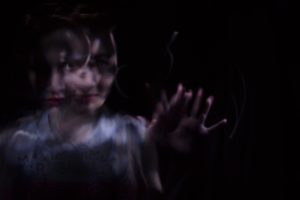
Photo by Mar Newhall on Unsplash
The thing about being young is we can’t imagine how decades of unappreciated and invisible work and support grind us down and polish a thick shell of cynicism. It turns out I did want some degree of appreciation and acknowledgement from my family for making a home. I couldn’t pull off the perfect wife/mother/housekeeping role with a clean white apron and endlessly abundant nurture, energy, patience, organization and efficiency with no return. I especially couldn’t do it while working outside the home, going to school and single parenting.
Fulfilling cultural expectations turned out not to be very fulfilling, after all.
 Eventually I found myself alone. Children grown and gone, a file folder labeled ‘Divorce’, and freedom to make a home solely for myself at last. Complete and total control. Bliss! I had a wonderful time giving myself exactly the kind of home I’d always dreamed of. All my efforts were on my own behalf. I didn’t care what anyone else thought and I didn’t need anyone to appreciate the home I made for myself. Housekeeping was uncomplicated, easy and filled with joy.
Eventually I found myself alone. Children grown and gone, a file folder labeled ‘Divorce’, and freedom to make a home solely for myself at last. Complete and total control. Bliss! I had a wonderful time giving myself exactly the kind of home I’d always dreamed of. All my efforts were on my own behalf. I didn’t care what anyone else thought and I didn’t need anyone to appreciate the home I made for myself. Housekeeping was uncomplicated, easy and filled with joy.
I concluded homemaking wasn’t, after all, a gift, a talent or an adequate offering. It didn’t translate as a declaration of love, support and commitment. My loved ones didn’t value my contribution. It was a meaningless use of my time and energy and put me in the vulnerable position of looking for validation and appreciation from others.
I felt like a fool, and it made me bitter. I promised myself never again would I try to make a home for anyone but myself.
I never imagined, even as a teenager, anyone would make a home for me. I wasn’t that naïve!

Photo by Vanessa von Wieding on Unsplash
Here in the tarnished and somber season of late fall and lengthening nights an amazing thing has happened.
I noticed it when I began coming home in the dark after work. My partner leaves lights on for me so I can easily negotiate backing into the driveway and navigate the steep cellar stairs. When I open the door at the top of the steps and enter the kitchen, the dishes are done. The house is warm and the wood stove glowing in the living room. The cat is fed. The kitchen smells of beef stew, chicken soup or baking.
Home. My home, but this time not created solely by me for someone else. This home is a collaboration, and it’s incomplete without me. I’m not invisible. My presence has worth. After all these years, all the meals and baking, all the housework and candles and welcoming lights in windows, the clean clothes, the fresh beds, the cared-for animals, the countless cords of wood for various stoves, all that invisible and unnoticed love, I’m reaping a late harvest.
Someone makes a home for me now, and waits for me to return, not to maintain it but to be part of it.
At the end of my workday, I’m actually at the end of my workday. I don’t have to unload the car, fumble my way into a dark house, turn on lights, get the woodstove going, make a meal, take care of pets and/or kids and/or adults, shut curtains and lock doors. My partner doesn’t meet me at the door with roses, wine and sweet talk. He gives me far more enduring and authentic gifts of a place and relationship to come home to. I discover those offerings are every bit as worthy as I imagined when I was a newly-married 21-year-old. All my work over the years was real. It was valuable. It was loving and important. It was a beautiful contribution. The fact that no one noticed or appreciated the home I made for them did not, after all, define the value of my intention.
I suppose it’s just one of life’s little ironies that now, at this late date when I’ve completely given up expectations and fantasies that others will perceive homemaking as an expression of love worthy of acknowledgement, someone in my life finally gives back to me what I’ve given in such abundance to others.
It’s a late harvest, but well worth the wait.

Photo by Craig Whitehead on Unsplash
All content on this site ©2018
Jennifer Rose
except where otherwise noted
by Jenny Rose | Aug 23, 2018 | Authenticity, Emotional Intelligence
Identity is everywhere. Identity theft, identity politics, job applications, and social media profiles confront us at every turn. We are constantly being commanded to prove our identity, not only formally, as in logging on to our bank accounts, but socially, in order to justify our existence, our beliefs and our values.
Technology has created new challenges in the way we talk about, understand and shape our identity. AI is no longer a piece of science fiction, and evidence grows regarding websites, social media trolls and other online entities that successfully manipulate, divide and interfere with social discourse, information and opinion.
We are woefully easy targets.
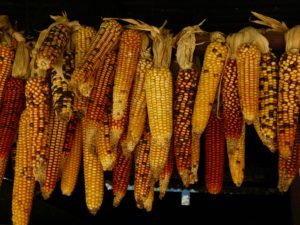
Photo by Roderico Y. Díaz on Unsplash
Merriam-Webster online defines identity as “sameness in all that constitutes the objective reality of a thing; the distinguishing character or personality of an individual.” The online Free Dictionary says identity is “the set of characteristics by which a person or thing is definitively recognizable or known; the awareness that an individual or group has of being a distinct, persisting entity.”
Objective reality. The term objective means “(of a person or their judgment) not influenced by personal feelings or opinions in considering and representing facts.” (Oxford Dictionary; emphasis mine.) This means a purple-polka-dotted snake cannot claim the identity of a green-striped zebra, no matter how indignantly and vociferously it insists it feels like one. Personality disorders are recognized as such because those who suffer from them are not always dealing with objective reality. A purple-polka-dotted snake who wants to be a green-striped zebra is divided tragically from itself and others, not only other purple-polka-dotted snakes, but all others, because it persists in trying to behave and be accepted as something it’s not, ultimately self-destructing.
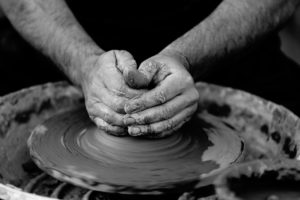
Photo by Quino Al on Unsplash”
I’ve written before about labels, denial, arguing with what is and pseudo self, all of which ideas intersect with identity. Have you watched a potter at work with clay on a wheel? As they shape a vessel, one hand works inside and one outside. Identity is like that. The tribe we’re born into gives us our earliest sense of identity, and we take our cues from them. If our tribe is critical and we feel unaccepted and unloved, we internalize those voices and viewpoints and give them power in our psyche to mold our identity. At the same time, we go out into the world and our schools, jobs, communities, places of worship and other organizations identify us from the outside.
Years ago I worked with a group of gifted and talented middle and high school students as a school librarian. None of them fit in terribly well with their classmates. A young man I was very fond of was quite lonely, as well as being brilliant, and he said one day he was nothing but the “fat boy.” He was sixteen years old, and seemed resigned to carrying the identity of “fat boy” to the end of his life. I told him, entirely sincerely, that I never thought of him as the “fat boy.” He was obese. Obviously, I noticed. But to me he was a funny, interesting, curious, compassionate, vulnerable human being. His weight concerned me because of the social stigma and quality of his health, but I never thought of him as the “fat boy.”
He could see that I was telling him the truth. I haven’t any idea what happened to him or what he’s been doing all these years, but I’ve always hoped he remembered there was an adult in his life who saw beyond the limitations of “fat boy” and recognized other pieces of his identity and potential. I hope he learned at some point that he didn’t have to settle for a life defined by his weight.

Photo by Edu Lauton on Unsplash
Over the years of my lifetime, more and more people seem to never mature past teenage identity. We build websites, profiles and a social media presence, desperately trying to sell a successful identity for attention, true love, power or money. We are so compulsive about taking selfies that we die doing it. There’s an explosion of people seeking plastic surgery in order to match their digitally-altered pictures. We have the technology to alter hair color, eye color and physical characteristics, and we’re saturated with digitally-altered images on media that keep us firmly convinced we’re unattractive and imperfect as we are. At the same time, we socially reinforce and perpetuate ridiculous gender, racial and ethnic roles, limitations and expectations.
Perfect strangers insist on imposing labels on us, or try to bully us into choosing one label over another. It’s an either-or black-and-white world, and new labels proliferate like maggots in road kill, creating ever-increasing lines of division and arenas for conflict.

Photo by Chris Barbalis on Unsplash
We are in such a hurry, we’re so overstimulated and anxious to not be left behind and to be validated, we’ve forgotten the simplicity of identity, and we’ve forgotten we don’t owe the world a public explanation or justification of our identity. Having a Facebook or Tinder profile does not constitute an identity. Having feelings and opinions about who we are is not an identity. Our carefully constructed pseudo self is not an identity. Our identity is not maintained and created by what others think, feel or say about us. Identity is not an endpoint, but a journey. Healthy identity is flexible. It adapts and changes as we live our lives. We are not who we wish we were, who we are afraid we are or necessarily who we think we are. We are not exactly who we were yesterday or who we’ll be tomorrow. We’re certainly not necessarily what others tell us we are, or must be, although objective reality always trumps our internal fantasies.
Our identity, like our power, is ours alone. We need not sell it or give it away, and it cannot be stolen from us. On the other hand, we must take responsibility for our own self-sabotage and mental disorders if we seek a healthy identity.
Healthy identity is complex and multi-dimensional. I’ve been daughter, sister, wife and mother, and I’m much more than any of those single roles. I’ve worked several jobs over my lifetime, but I’m more than any of those jobs. I have a physical identity in terms of vital statistics, Caucasian skin, blue eyes and female biology, but none of those markers identify me as completely as the fact that I’m a human being. A healthy identity also accommodates shadows, scars, less-than-useful coping mechanisms and behavior patterns.
My wish simply is to live my life as fully as I can. In both our work and our leisure, I think, we should be so employed. And in our time this means that we must save ourselves from the products that we are asked to buy in order, ultimately, to replace ourselves.”
Wendell Berry, The Art of the Commonplace: The Agrarian Essays
Tech allows us to create superficial fantasies of bright colors and pleasurable images, but those worlds are empty and brittle, like an enticing piece of candy that melts in a minute on our tongue and leaves nothing but the taste of sugar and artificial flavor. We cannot judge identity by houses, gardens, cars, vacations, pets, children, selfies, clothing, jobs or partners. Our possessions, our pictures and our memorabilia are not our identity. Somewhere, under all that stuff, behind all those pictures of success and happiness, apart from our fear and unwillingness to come to terms with our objective reality and our denial, lies the powerful, complex, fascinating, valuable person we really are, and that person longs to be identified and welcomed into life. That person longs to give and receive love, make a valued contribution and live authentically.
I’m interested in the way people self-define and introduce themselves. It always points to either what we ourselves feel is the largest part of our identity or what we think others will value or connect with most readily. This is what lies beneath every dating profile. What do we imagine prospective partners will be most attracted to? What’s the perfect thing to say which will limit unwanted matches and encourage those we imagine might provide whatever we’re looking for? How can we optimize the algorithm and make it work for us?
Sometimes I walk away from meeting a new person feeling overwhelmed and deafened by all the ways they labeled themselves but with no sense of the real human being I just interacted with. Instead of an easy, exploratory, getting-to-know-one-another conversation, I was bludgeoned with political jargon and identifiers, patronized and gratuitously instructed out of some kind of claimed expertise. It feels aggressive, weak and demanding. This is who I am and you will recognize my status, authority and identity! If you don’t apply one of my proud labels to yourself, you should. All the best people do. In any event, my labels are better than yours.
Our identity is not for others, but for ourselves. We’re the ones who need to know who we are, experience our feelings and monitor our thoughts. We’re the ones in charge of our dignity, our sexuality and our choices. We’re the ones responsible for our own integrity. As my hair greys and my fertility wanes, I become more and more physically invisible in the world. At the same time, I’ve never been as strong, as resilient, as wise and as compassionate as I am now. I’ve never loved so well. I’ve never felt so whole or comfortable in my own skin. I have no social media accounts and no cell phone. I don’t use any kind of apps, dating or otherwise. My identity is strong and dynamic, and it’s not for sale or on display. In fact, I’ve always felt being invisible is a great advantage. People who attract no attention are invariably underestimated and overlooked, especially aging female people.
At the end of the day, a life well lived is about being who we are, objective reality included, because everyone else is taken. Fantasy is fun, but real life is where all the juice is.
My daily crime.
“I look like vanilla pudding so nobody knows that on the inside I am spider soup.”
Andrea Portes, Anatomy of a Misfit

Photo by Cristian Newman on Unsplash
All content on this site ©2018
Jennifer Rose
except where otherwise noted
by Jenny Rose | Aug 9, 2018 | Connection & Community, Emotional Intelligence, Parenting
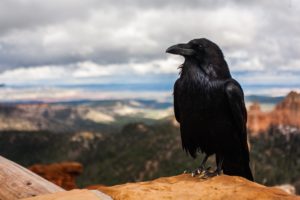
Photo by Tyler Quiring on Unsplash
We have the great privilege of living close to ravens. These intelligent and entertaining birds make the area off our deck part of their daily rounds, because that’s where we fling the mice caught in mousetraps in the kitchen cupboards, as well as the occasional food rubbish. They’re wary birds. Any flicker of movement in a window sends them aloft, no matter how tempting the morsel on the ground. They make a variety of sounds, but can also be as quiet as a shadow as they wheel over the house, circling and examining the grassy slope below the deck.
This year a pair nested nearby and raised at least one fledgling successfully. Both parents feed the nestlings. A few weeks ago, some instinctive wisdom told the raven parents it was time to stop feeding the fledglings and all hell broke loose in the neighborhood.
The first we knew of it was a plaintive croaking cry, vaguely like a canine yap. We heard it over and over again, clearly coming from something on the wing. It began down over the river and moved up the hill to the house and then I could see the birds. The fledgling was pudgy and puffy, the way all young birds are at the adolescent stage. It looked a little bigger than the adult birds, but not nearly as sleek and not as skilled a flier. The adults flew around it in what looked like a mixture of distress and encouragement, and the youngster complained. And complained. And complained. For hours. Then for days. From first light until sunset it went on.
We watched the parent birds, looking more harried by the day, try to go about their usual rounds up and down the road for roadkill, over our place, over the river and pond, followed everywhere by their noisy, clumsy, demanding offspring, who certainly had the ability and strength to feed himself, if not the desire. At rest, the youngster would gape pathetically, begging each parent in turn for a regurgitated mouthful. Repeatedly, the parents turned away, flew away, dogged and determined.
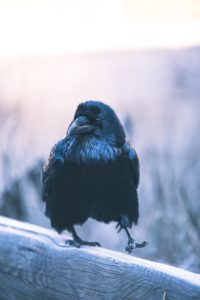
Photo by Casey Horner on Unsplash
Ravens are great generalists in terms of their diet. I’m sure the fledgling watched his parents eat carrion, fish, frogs, small reptiles and mammals, insects and plant matter. What we were witnessing was not starvation due to lack of available food, or lack of parenting. What played out before us was nothing more or less than adolescent outrage and parenting far superior to anything I ever achieved.
Both my partner and I are parents and worked for years with parents and children. We watched the ravens with a mixture of amusement, empathy and irritation. “Go find your own dead thing,” my partner muttered, imagining the parent birds’ conversation with the importuning fledgling and making me laugh.
When my two sons chose to leave the little mountain town where we lived and finish out their high school years with their dad in the city, I knew it was the right thing for them to do. It was sooner than I had anticipated, true, but we all recognized they had outgrown the school, the town and me. We were no longer living in harmony.
When I found myself alone, I grieved for a long time. I also sold the house and started shaping a life for myself with the good feeling of a difficult job done to the very best of my ability. I’d given all I could and it was time for them to fly and find their own lives. In the space where they had been for fifteen years I could build new freedom and possibility.
Except they were nearly always in my thoughts. We had long phone conversations. I fretted because I couldn’t interact with them face-to-face and I knew many things were happening in their lives they weren’t telling me about. They did tell me of jobs, roommates, broken-down cars, financial difficulties, bars, music, both new and old friends, and romantic entanglements. They called when they were broken-hearted, scared, confused or just pissed off. Frequently, by the time I got off the phone, I was in tears and spent the rest of the day upset, or lay sleepless wondering what I could do. What I should do. What I should have done as a parent that I didn’t do that might have avoided the current crisis.
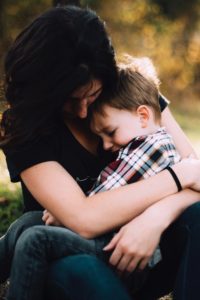
Photo by Jordan Whitt on Unsplash
I discovered parenting adults is extraordinarily stressful and difficult, with none of the sweet pay-offs I had when we were a family living together. I didn’t see them playing and laughing anymore. I couldn’t touch them or hold them. We couldn’t hang out quietly together. I couldn’t cook for them or watch their faces and bodies mature, marveling at these two people their father and I created.
I’ve recognized in the years between their leaving me and now I wasn’t the excellent parent I thought I was. I was, in fact, merely adequate. I made a lot of mistakes. I was in many ways ill-equipped to parent. Single parenting is an almost impossibly hard road.
I talk to other mothers of adults. Some talk at length about their kids — how proud they are of them, how close they are to them, how successful their kids are. Those parents need no questioning or encouragement. Their conversation is full of their kids all the time, without prompting, and sometimes it’s hard to tell whether the offspring in question is ten or thirty.
Other women, though, acknowledge kids, grandkids and great grandkids, but are not nearly so forthcoming. I’m of that tribe now. Given a sympathetic listener and a relationship of trust, these women tell stories of various addictions, mental illness, toxic relationships, unplanned grandchildren and great-grandchildren, financial struggles, pain, anger, grief and guilt. We find ourselves raising grandchildren and great-grandchildren. We co-sign for loans we can’t afford to pay off. We wonder what we did, or said, or didn’t do or didn’t say that resulted in our kids’ addictions, struggles and unhappiness.
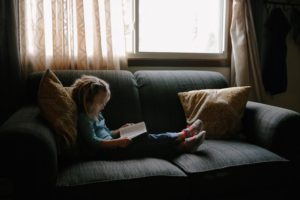
Photo by Josh Applegate on Unsplash
The love that was once the center of our lives and priorities, the strongest, purest feeling we’ve ever had, gradually becomes bewildered and confused. We look everywhere for the children of our memories, but they’re gone. Now, in front of us, are adults. From adults we want responsibility, appropriate boundaries and reciprocity, but our adult children want the unobstructed flow of our nurturing, support and unconditional love to continue, just as it did when they were children.
I didn’t think it would be like this, and neither did my friends.
My thoughts and feelings about my experience as a parent are so tangled I can’t see anything very clearly. Perhaps that’s why I was so taken with the ravens. The animal kingdom has a kind of brutal simplicity with regard to parenting, an instinctive wisdom without concern for what anyone else thinks or cultural and societal norms. The raven parents knew what to do and they did it and endured a few days of discomfort.
Does that mother bird now worry about whether the young adult is happy or not?
Sigh. Probably not.
I notice I never even consider blaming my parents for my happiness or unhappiness. Why, then, do I persist in blaming myself for my adult sons’ choices? Why do I think it’s any of my business at all?
Because I love them.
And so?
And so I want them to be well, and happy, and have good lives.
There are deeper truths, though. I want to be able to think of myself as a great parent. The proof? My adult kids have happy, healthy lives. See how great I was? I also want them to be happy so I don’t have the discomfort of knowing they’re unhappy. How’s that for a piece of maternal selfishness?
So, what, exactly, does a happy, healthy life look like? Is it a life we can boast about in company to illustrate the competence of our parenting? Is it the life “everyone” approves of? Is it the life I approve of? Why do I think I know what a happy, healthy life is for anyone except myself? Most important of all, why did I think I had the power to determine the kind of lives my kids would have?
As parents, we have a lot of power, at least in the beginning. But our power is mixed up with other factors which are not in our control, like genetics, culture, geography and politics. If we judge our parenting effectiveness by the perfect happiness of our adult children, we’re all monumental failures. Life is not one unbroken experience of unadulterated happiness for anyone. Unblemished happiness is, in any case, a lazy, childish goal. What does it mean? Something different to everyone, probably.
What about competence? Yes. I want my kids to be competent. I want them to be able to learn. I want them to have the power to make their own choices and the strength to deal with the consequences. I want them to know how to self-care and love others. I want them to be compassionate, respectful and responsible.
I want those things for them, but I also want them for me so I can feel I parented well and gave them the kind of start every child deserves.
Parenting is an odd business. We enter into years of chaos and hard work and watch our children grow up, never realizing we’re growing up, in many ways, alongside them.
As parents, is it about us, or is about our kids?
I suppose the honest answer is it’s about both, although it feels shameful to admit that out loud.
On the other hand, maybe that’s exactly the way it’s supposed to be. Who knows?
Ravens are solitary. We still have a couple in the neighborhood. I wonder if the youngster has left to find new territory. In time, he may find a mate and raise his own fledglings. He may be killed by a car, a gun, or a predator. He’s on his own in the big world to live his life, however that is, and die his death, however that is. Will the parent birds know? If they know, will they care? Would their knowing or caring assist the young bird in any way, or have they given everything needed already, including forcing the adolescent to begin feeding himself?
I don’t have answers. Nobody I’ve spoken to has answers, but we’re all asking these questions.
I wonder what the ravens would say.
I’m off to find my own healthy and happy afternoon and give my concerns about everyone else a rest.

Photo by Liane Metzler on Unsplash
All content on this site ©2018
Jennifer Rose
except where otherwise noted

























